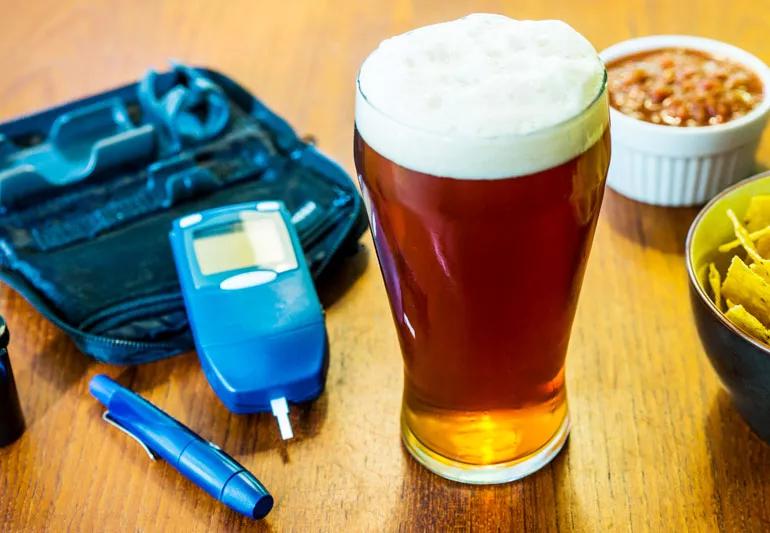Blood glucose monitoring and drinking in moderation can help you avoid hypoglycemia

Image content: This image is available to view online.
View image online (https://assets.clevelandclinic.org/transform/e2c22b64-eac7-48ed-8190-00e9ff9dd4ef/alcoholDiabetes-864411938-770x553-1_jpg)
beer glass sitting beside diabetes testing equipment
Alcohol comes with a warning label in the United States and many other countries. It’s a reminder that consumption should come with a degree of caution.
Advertisement
Cleveland Clinic is a non-profit academic medical center. Advertising on our site helps support our mission. We do not endorse non-Cleveland Clinic products or services. Policy
That’s true for all drinkers — but it’s especially true if you have diabetes.
Beer, wine and liquor can interfere with diabetes medications (like insulin), disrupt condition management plans and cause other complications that could take a dangerous turn for your health.
Now, does that mean that someone with diabetes can’t drink alcohol? Not at all. But if you have diabetes and want to enjoy happy hour, it’s best to take an approach that offers you some protection.
Let’s get a plan together with diabetes educator Andrea Harris, RN, CDCES.
Maybe … but maybe not, too. There’s no one answer. That’s why it’s best to talk with your healthcare provider about drinking alcohol when you have diabetes and how (or whether) you can do it safely.
“You need to know if your medications or any diabetes-related conditions you have could be seriously affected by alcohol consumption,” emphasizes Harris.
When it comes to alcohol and diabetes, two related factors come into play — how diabetes medications and alcohol coexist in your system and the effect that drinking has on your liver. Let’s look at both.
Most diabetes medications work to lower your blood sugar (glucose) levels — and they’re particularly good at the job. The problem? Alcohol does the same thing, especially when consumed in larger quantities.
Advertisement
That sort of double impact can cause blood sugar levels to drop to dangerously low levels, a condition known as hypoglycemia.
What’s particularly concerning is that drunkenness and hypoglycemia can look and feel similar, notes Harris. Shared symptoms include:
One last concern, too: The effects of alcohol on your blood sugar can last as long as 24 hours.
Warehousing glycogen, the stored form of glucose, is among the many tasks your liver performs. The glycogen stays there until your liver breaks it down for release to address low blood sugar.
But when you drink alcohol, your liver neglects its blood sugar duties while turning its attention to another one of its jobs — removing toxins from your blood. (And alcohol, as we all know, is a toxin.)
Basically, it’s another path toward hypoglycemia.
To safely consume alcohol while managing diabetes, Harris offers these six tips:
Drinking alcohol isn’t truly “good” for anyone. It can raise your blood pressure and drive up your heart rate. It can fuel anxiety, disrupt sleep and leave your body dehydrated. It can become addictive.
But if you have diabetes, there’s an extra layer of concern that demands attention.
The keys to safely drinking if you have diabetes are to drink in moderation and check your blood sugar regularly, advises Harris. Those two steps will go a long way toward keeping you healthy. Cheers!
Advertisement

Sign up for our Health Essentials emails for expert guidance on nutrition, fitness, sleep, skin care and more.
Learn more about our editorial process.
Advertisement
There are better breakfast options, but if it’s got to be cereal, look for whole grains, high fiber and no added sugar
A diabetes diagnosis, new or long-standing, can trigger reactions like grief, stress, depression and frustration, but symptom relief and help are available
Type 1 diabetes happens when your body doesn’t make insulin, while Type 2 happens when your body can’t use insulin properly
There is an indirect link between the sweet substance and the condition
The short answer: Yes, but you need to eat it in moderation and keep track of how much you consume
Sweet potatoes are great, but sweetened drinks aren’t so great
Some sweeteners may have health risks, so it’s best to keep your intake moderate
Indulge your sweet tooth with these desserts, each with 7 grams of sugar or fewer
Type 2 diabetes isn’t inevitable with these dietary changes
Applying a hot or cold compress can help with pain
Pump up your iron intake with foods like tuna, tofu and turkey